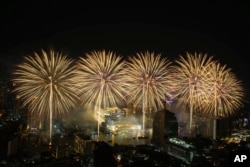During its New Year’s Eve show, CNN, the Atlanta-based, multinational cable news channel, made several errors in which Thailand and Taiwan were mixed up.
Those errors were summarized by the English-language online newspaper Taiwan News.
Will Ripley, a Taipei-based CNN senior international correspondent who participated in the New Year’s Eve broadcast, addressed the matter on Twitter.
He acknowledged that confusing Taiwan and Thailand is a “sensitive topic for many.” Ripley added that his Hong Kong-based CNN colleague, Kristie Lu Stout, who took part in the live broadcast, “would never confuse” Thailand and Taiwan.
He attributed the graphics and footage errors to “technical problems,” saying live TV is “tricky.”
But China’s foreign ministry spokeswoman Hua Chunying used CNN’s broadcasting gaffes to attack U.S. Taiwan policy.
Hua tweeted a screenshot of one of the mistakes. That image showed New Year’s fireworks, with a graphic identifying the location as “Bangkok, Taiwan.”
Bangkok, of course, is Thailand’s capital, not Taiwan’s.
"Seems a bit of geography and history lesson is in order for those who vow to defend Taiwan but really don't have a clue where it is,” Hua wrote.
CNN, like any media company, is fair game for criticism. But it is misleading for a Chinese government spokesperson to seize on mistakes made by a privately-owned cable news channel to criticize U.S. government policy.
First, some background on U.S.-China tensions over Taiwan.
On September 18, 2022, U.S. President Joe Biden told CBS television’s "60 Minutes” program that U.S. forces would defend democratically-governed Taiwan if China launched an “unprecedented attack.”
That upset Beijing, which says Taiwan is part of China under the so-called "One China Policy.”
Washington recognizes the communist government in Beijing as “the sole legal government of China,” but only acknowledges “Beijing’s position that Taiwan is part of China.” The U.S. does not take a position on Taiwan’s sovereignty.
Tensions ratcheted up on August 2, 2022, when then-U.S. House of Representatives Speaker Nancy Pelosi visited Taiwan to, in her words, “honor America’s unwavering commitment to supporting Taiwan’s vibrant democracy.”
China reacted fiercely to that visit, carrying out live fire drills and other military maneuvers in the sea and air around Taiwan.
But what does that have to do with CNN’s New Year’s Eve broadcast?
China, like other authoritarian regimes, regularly treats Western media as uniformly representing the interests of the U.S. government.
In fact, U.S. media outlets (like others in “the West”) have a variety of funding and ownership structures, not to mention editorial lines. Voice of America (VOA), for example, is part of the U.S. Agency for Global Media (USAGM), the U.S. government agency that oversees all non-military, U.S. international broadcasting. However, a legal firewall prohibits political interference in VOA’s reporting.
As Polygraph.info previously noted, China’s attacks on Western media often appear based on the assumption (or deliberate misrepresentation) that they function like Chinese state media.
In 2016, Chinese President Xi Jinping ordered state-run media to strictly follow the Chinese Communist Party (CCP) leadership and focus on "positive reporting.”
“All news media run by the Party must work to speak for the Party's will and its propositions and protect the Party's authority and unity,” China’s state-run Xinhua news agency cited Xi as saying.
Xi further called for “Marxist journalistic education” to be “promoted among journalists.”
Some in China frame Western media as being “fundamentally biased against China,” often because of critical reporting on Tibet, Xinjiang, human rights concerns and other issues sensitive to the CCP.
Hua’s statement indicates a belief that CNN, a private company, functions like Chinese-state media.
In this case, the CNN broadcast’s mistakes were not made by the reporters on air.
Ripley was broadcasting from outside Taipei 101, Taiwan’s tallest building, where a fireworks show was held. Stout was broadcasting from Hong Kong. In a video clip posted to Twitter by Ripley, Stout tells Ripley: “I know you’re in Taipei, we’re talking about Bangkok now,” as the New Year had just arrived in the Thai capital, which is one hour behind Taipei and Hong Kong.
That may have contributed to the production errors during the broadcast.
Both reporters discussed their experiences in Bangkok, and they named local landmarks in the Thai capital. Stout specifically referenced the King Power Mahanakhon skyscraper as a good location from which to view New Year’s fireworks in the Thai capital. Ripley cited another skyscraper’s rooftop cocktail bar, Sky Bar.
Still, Andy Boreham, a columnist for China’s state-run Shanghai Daily newspaper, replied to Ripley’s Twitter post, writing: “Yet No excuses, Will — I guarantee you could never point to both places on a blank map.”
In a glowing profile, the CCP-controlled newspaper Global Times said Boreham has “a great passion to showcase the real China.” It added that his “Reports on China” YouTube series “conveys factual stories in China and analyzes how Western media sources distort such coverage.”
Twitter labels Boreham "China state-affiliated media.”
Meantime, Russia treats Western media in a similar way. Russian state broadcaster RT (formerly Russia Today) regularly highlights mistakes made by CNN.
Several examples can be seen here, here and here.
In its “ultimate guide” to “mainstream” media, RT wrote: “CNN’s worldview can best be deciphered from studying the speeches of Hillary Clinton.”
Russian President Vladimir Putin had a notoriously contentious view of Clinton, formerly a secretary of state, U.S. senator and Democratic Party presidential contender. Clinton is now a private citizen, although it is unclear if the RT guide was written while Clinton was still in government.
But while CNN is privately owned and operated, RT actually functions like a mouthpiece of the Kremlin.
In a January 2022 report, the U.S. State Department said RT and its sister organization, Sputnik, use “the guise of conventional international media outlets to provide disinformation and propaganda support for the Kremlin’s foreign policy objectives.”
The report added that “Russian government officials and the outlets’ leadership have openly discussed RT and Sputnik’s role as tools of state propaganda.”







